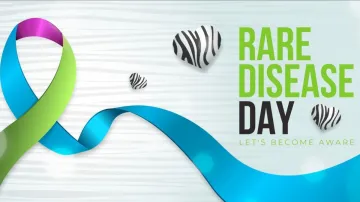Rare Disease Day 2024: Cystic Fibrosis to Galactosemia, know ways to manage rare diseases in newborns
Optimism, understanding, and collaborative thinking are essential for navigating complex diseases and situations. By permitting early evaluation and diagnosis, parents may get ideal results even after the vacation has concluded.

The world will observe Rare Disease Day 2024 on January 29 to raise awareness for people who are affected by rare diseases. Newborns too get affected by rare diseases. Although these diseases are unusual, they can have a significant impact on an infant's health. As a result, it is critical to continuously monitor any atypical diseases in neonates, including their causes, symptoms, diagnosis, and potential treatment choices. By remaining vigilant about their child's health, parents can effectively advocate for their child's needs and give immediate aid when needed.
Understanding rare disorders in babies
According to Dr Sarah Bailur, MBBS, DNB(Peds), FICG, FSIAMS, Consultant Clinical Geneticist, Rainbow Children's Hospital, Banjara Hills, uncommon diseases, often known as orphan diseases, have a low frequency in the general population, generally affecting one in every 2000 people. While uncommon as individuals, these ailments affect millions of people globally. Rare illnesses in infants may appear in several ways, including genetic problems, metabolic syndrome, and congenital anomalies. Despite their rarity, these illnesses can have serious implications, affecting numerous organs and causing permanent impairment if not addressed.
Rare illnesses of newborns
Genetic diseases such as cystic fibrosis, phenylketonuria (PKU) as well as sickle cell diseases are caused by anomalies present in an individual’s DNA and are typically inherited. It is of concern that newborns tend to develop these hereditary disorders.
Metabolic diseases, such as maple syrup urine disease (MSUD) and galactosemia, arise from a lack of ability in the body to properly break down certain nutrients and chemicals. These conditions can lead to severe health complications if left undetected and untreated.
Inherited abnormalities are rare diseases that manifest as physical defects present at birth, called congenital anomalies. Some examples include heart defects, spinal defects such as spina bifida, and structural abnormalities like cleft palate.
Recognising uncommon diseases in infants can pose a challenge for medical professionals, as the symptoms often overlap with more common illnesses. Parents must stay vigilant and seek medical attention if their child displays any of the following warning signs:
- Failure to thrive or inadequate weight gain
- Developmental delays or regression
- Unexplained feeding difficulties or vomiting
- Abnormalities in physical appearance or features
- Persistent jaundice or abnormal liver function tests
Examination and testing
Early discovery of rare diseases in neonates leads to improved treatment outcomes. Many countries have launched newborn screening programs to detect these disorders as soon as feasible after delivery. These tests often involve taking a small amount of blood from a baby's foot and testing it for specific indicators associated with problems. In addition to newborn screening, genetic testing and imaging may be used in the diagnosis to confirm or rule out suspected rare illnesses.
Treatment and use
Treatment options for unusual neonatal illnesses vary depending on the underlying cause and seriousness. Most Inborn errors are treatable only when diagnosed in the neonatal period and thus newborn screening is an essential test to diagnose thereby helping with early commencement of treatment to prevent fatal outcomes. In certain cases, treatments are designed to control symptoms while also improving the child's quality of life. This might involve dietary changes, medicines, or professional treatments such as early interventional therapy and physical therapy.
New medications such as bone marrow transplantation, and enzyme replacement therapy for some genetic diseases, may provide management and treatment options.
Recurrence in pregnancy
Most genetic illnesses are inherited with a chance of recurrence during pregnancy and are run in families. To prevent the recurrence of these disorders during pregnancy, it is crucial to recommend the appropriate test in pregnancies, which can be accomplished using techniques like amniocentesis or chorionic villous sampling. It is recommended that parents visit the doctor before planning a pregnancy.
Support and resources for parents
Parenthood is a life-changing event, and no matter how prepared parents are, they will always experience worry and anxiety as they embark on this new chapter in their lives. Especially in a situation where a newborn is diagnosed with a rare condition, parents feel helpless, overwhelmed and unsure. However, luckily there are numerous support organisations, advocacy groups, and online communities that provide counsel, resources, and emotional support to families confronting these issues. Networking with people who have had similar experiences may give parents support, encouragement, and practical guidance to help them navigate their path successfully. Aside from raising awareness of uncommon diseases, it's critical to take an active role in discussing your child's condition with others and offering support, as it's common to observe that hereditary diseases run in families without any discussion.
ALSO READ: Study finds self-monitoring boosts physical activity in elderly who require care